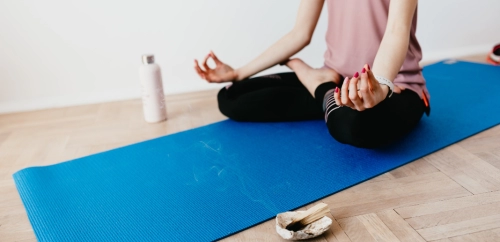How Can I Stay Mindful All Day?

There are so many moments every day that one can take time to embrace their inner thoughts and become more aware of their surroundings. Developing this awareness will allow the individual to be more present in their life, and that, in turn, will help them live a more balanced and healthy life. The benefits you get from including mindfulness practice in your everyday life can be vast, including improved mental health and physical health.
Staying mindful all day is something that can be done quite easily. Whether it's by taking a few moments to be mindful while you're brushing your teeth or sticking post-it notes on your door or phone to remind you to be mindful. You can incorporate mindfulness into your life all the time.
To do this, we'll look at the importance of being mindful and how it can affect the four foundations of your being, as well as some tips to help you incorporate mindfulness into your everyday routines consistently.
The Importance of Being Mindful
Becoming more mindful in your everyday life is not an easy prospect. It takes dedication and patience to instill these practices into your hectic life. Let's take a look at the importance of being mindful and what it can bring to your relationships, health, and overall well-being:
Mindfulness can help you remain at peace. This means that you will struggle less with situations that may come up in your everyday life.
These practices can also help you handle issues you may have with being overindulgent in certain things like food or shopping.
Having mindfulness involved in your everyday life all day can help you not be so averse to certain situations.
Incorporating mindfulness into your life can help you become more compassionate and empathetic to others, as well as yourself.
*You will be able to appreciate each and every moment of your life and the people and experiences you gain from them.
Mindfulness All Day: Four Foundations Broken Down
Mindfulness practices have a root base in Buddhist traditions. It is a practice that allows you to build awareness of yourself and your surroundings and develop things like non-judgmental attitudes and empathy. By practicing them every day and periodically throughout those days, you will be building these skills.
Because the practices are based on Buddhist traditions, oftentimes people break them down into the four foundations. These are body, mind, feelings, and awareness. Though they do go by different names within the Buddhist tradition, we decided to utilize the more basic categorizations so that even if you are not someone who follows the Buddhist traditions, you will get the most possible from them.
So here is how the four foundations correlate with mindfulness practices:
Body
When you're attempting to stay mindful throughout your day, you have to tune into your body. To do this you have to be able to take breaths and really think about the physical sensations you're feeling at that moment.
Many people, when doing this, take the standpoint that their body is not who they are. It is only a part of themselves. This means that you can experience the present moment by simply thinking about how things feel and how you are feeling in that body part.
Mind
The mind is one of the most important tools when it comes to building your mindfulness practice. When it comes to the four foundations, this is all about understanding your consciousness. This means that you have to take the time to understand your emotions and sensations and how they affect your mental states.
When you're able to do this, you can build a non-reactive life that allows for the acceptance of those feelings. Doing this allows you to be more in tune with yourself, and that in turn will help you be more in tune with the world around you as well as the people within your life.
Feelings
One of the biggest hurdles to becoming mindful and being able to do that every day, all day, is our lack of ability to focus on our feelings. There are feelings that we have that we are averse to acknowledging, and this puts up a block in our system which doesn't allow us to live in the present moment.
Feelings like anger or sadness are ones that we try to shy away from, but they are part of life and must be accepted so that we can stay present in the moment. There are no bad feelings, just bad reactions to those feelings. So by being able to acknowledge them, we can remove the inclination of having bad reactions and work our way through them into a better, more balanced being.
Awareness
In the Buddhist tradition, this is called Dharma. Basically, this is the idea that you can become mindful of the way things are in the world. That ties into the impermanence and selfishness that are present in all of us. Understanding these inclinations can allow you to open your arms and find a way through these feelings and thoughts.
This will, in turn, help build acceptance and empathy not only for yourself but for others. It'll also allow you to be able to address when these issues arise and quickly correct yourself so that you can remain in the moment and present at all times.
How Can I Stay Mindful All Day? Tips For Staying Mindful All Day
Now that you understand the importance and a few ideas of how you can stay mindful all day, we can take a look at a few tips that might help you build this into a consistent habit and way of life:
Waking Up
When you wake up, oftentimes you're on the go. You have to get up, get dressed, and get out the door to get to work. But take a few seconds before you remove yourself from that bed and take a few deep breaths. After three deep breaths, you can then get up and start your day, and you should be starting in a more mindful frame of mind.
Brushing Teeth
One of the tasks you do before you head out the door is to brush your teeth. But the truth is, any activity you do can be made into a mindfulness practice period. Instead of thinking about everything you have to do for the day, take the time to really check in with your body and note the physical sensations and all other senses that come with brushing your teeth. This can be almost like a small meditation to start your day.
Drinking
Just like with brushing your teeth, having your morning beverage (or any beverage throughout the day) can be a meditational and mindful practice. When you take the first couple of sips, make sure you sit down and really enjoy them. Take in all your senses and note what is happening so that you are gearing yourself to be present in every moment.
Sticky Notes
Sticky notes can be a great way to remind yourself to stop and take a moment so that you can be mindful all day. Place these sticky notes with reminders or inspirational quotes in places that you will see throughout the day. This can be on your mirror, in the bathroom, on your phone, on your desk, or even on your computer screen. Having these constant reminders will trigger your brain to know that you need to stop and take in the moment.
Final Thoughts
By making sure that you set up systems and triggers throughout your day to make you stop and be present, you can incorporate mindfulness practices into your everyday routines. In the end, by doing this, you will be able to build yourself a practice that allows you to find your way to a more balanced and happier life.















